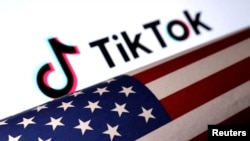The American subsidiary of the Chinese owner of TikTok has asked the U.S. Supreme Court strike down a law that would ban, in less than 10 days, the social media platform on grounds of national security.
Unless the justices overturn the act of Congress or issue a temporary injunction, “essentially the platform shuts down” on January 19, TikTok attorney Noel Francisco told the court during oral arguments Friday.
Francisco argued that free-speech principles stated in the U.S. Constitution’s First Amendment should make the ban unconstitutional.
Ten months ago, Congress passed a law that China-based ByteDance must divest TikTok U.S. or be banned because of national security concerns.
Lawmakers, on a bipartisan basis, voted 352-62 in favor of the legislation, convinced of risks posed by Beijing’s potential access to personal data and the ability to shape public opinion for its 170 million American users.
“This act should not stand,” Francisco, who was U.S. solicitor general in the first administration of President-elect Donald Trump, told the high court.
Possible content manipulation
The justices, in their questioning of Francisco, zeroed in on concerns about potential content manipulation on TikTok by China.
Francisco told the court there are protections in place to protect the data and TikTok is not a “Chinese [government] cutout.”
ByteDance cannot be trusted to keep its word that it would protect its American users’ privacy, according to the current solicitor general, Elizabeth Prelogar, who reminded the court that the Chinese company had used TikTok location data of journalists in an attempt to uncover which of its employees was leaking information to reporters.
Prelogar also said there is evidence that ByteDance has yielded to Chinese government pressure to censor content on TikTok.
Justice Brett Kavanaugh raised a concern about whether there is a reasonable risk that the Chinese government, someday, could use the personal information it has on its American users to “develop spies, turn people, blackmail people” if they work for the U.S. Federal Bureau of Investigation or the Central Intelligence Agency.
That was emphasized by Prelogar, arguing in favor of a ban of what she acknowledged has become a “key American communications channel” as the most popular social media site in the country.
The platform poses “a grave threat” to national security because China “could weaponize TikTok at any time to harm the United States,” said Prelogar.
Foreign adversaries spying on Americans’ communication is an increasing concern of U.S. intelligence agencies. It was recently revealed that hackers linked to China had deeply infiltrated telecommunications systems in the United States. The U.S. Treasury Department disclosed last month a successful Chinese hack.
Two of the justices, Elena Kagan and Neil Gorsuch, expressed skepticism about Prelogar’s contention that a ban on TikTok or ordered divestiture is justified to repel Chinese covert influence, noting this is a potential problem with all social media platforms.
Francisco noted that the deadline for TikTok will come on the last full day of the presidency of Joe Biden and it is possible after Trump returns to the White House on January 20 “we might be in a different world.”
Trump had asked the Supreme Court to put the case on hold so he can negotiate a sale of TikTok’s U.S. assets following his second inauguration.
Trump shifts stance
Both Biden and Trump had backed the ban. But Trump expressed a recent change of heart after his campaign videos during last year’s election performed well on the platform.
“They brought me a chart, and it was a record. It was so beautiful to see. And as I looked at it, I said, ‘Maybe we got to keep this sucker around for a little while,’ ” Trump said during an appearance in Phoenix in December.
In an exchange with the justices, the solicitor general suggested Trump might change his mind about giving ByteDance an extended reprieve if he were to review, after his inauguration, the national security information gathered about TikTok during the four years he was out of office.
A Stanford University law professor, Jeffrey Fisher, representing TikTok’s content creators and users before the Supreme Court on Friday, emphasized the freedom-of-speech argument.
TikTok’s American creators “have a right to work with the publisher of their choice,” said Fisher in his appearance before the nine justices, following Francisco.
Several dozen TikTok content creators gathered in front of the Supreme Court during Friday’s hearing, some providing online updates of the proceedings for their followers.
Fisher said the option of migrating to another platform, such as Meta-owned Instagram, is not a viable alternative for his clients who are not celebrities, but “ordinary Americans” privileged by TikTok’s unique algorithm “based on the creativity of their content.”
Unless there is a fire sale or the Supreme Court issues a reprieve, the billions of comedy skits, dance challenges, life hacks, pet tricks and cute babies on TikTok would become invisible in the United States.
Parent company ByteDance has more than 150,000 employees globally, including U.S. offices in Los Angeles, New York, Seattle and Austin, Texas.
“Assuming the Supreme Court upholds the law — unless the Trump administration can find some workaround, which I’m doubtful they’ll be able to — the choice is either sell TikTok or face a ban in the United States,” Alan Rozenshtein, an associate professor at the University of Minnesota School of Law, told VOA prior to Friday’s hearing.
Canadian investor Kevin O’Leary said that he has informed Trump that he’s nearing a deal with billionaire Frank McCourt to buy the U.S. assets of TikTok – a move that would save it from being banned.
“I wanted to let him know, as well as others in his Cabinet, that we’re doing this, and we’re going to need their help,” O’Leary, best known as one of the hosts of the reality TV program "Shark Tank," told Fox News.





